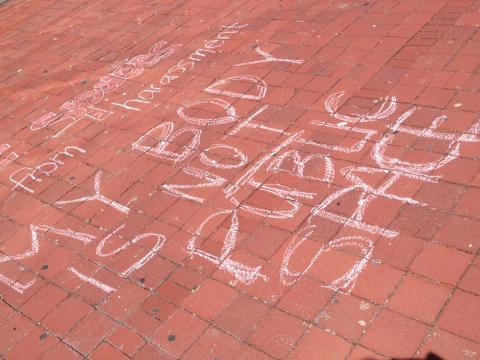Tell us a bit about CASS!
Jessica Raven: Collective Action for Safe Spaces (CASS) is a local, mostly volunteer-run nonprofit organization working to address street harassment in DC through community organizing, training, awareness campaigns, and arts activism. It was founded in 2009 as HollaBack! DC, a blog to collect stories of DC residents’ experiences with street harassment, defined as public sexual harassment and assault, and over the years it has increasingly evolved to address all forms of harassment, and especially gender-based harassment against some of our city’s most marginalized communities. Since we shifted our focus in 2015 to prioritize the needs of communities of color, we are also in a process of refining our mission statement to ensure that we’re working to build safe public spaces for everyone.
How did you first come to this work, and get involved with CASS?
JR: I’ve experienced street harassment since I was 12 years old. The first time, I was walking home from high school orientation, and I was followed by a man on a bike for miles – leering, making sexual noises, shouting sexual comments, and ultimately flashing me. Street harassment quickly became just a fact of life for me growing up in New York City, and so it didn’t startle me when I moved to DC. I had become so desensitized to this experience that I usually brushed it off. That changed for me when I was pregnant. I started to get comments on the street like “Do you want to make another one later?” and shortly after my son was born “Do you think he wants a twin brother?” I realized that I didn’t want my children to grow up in a world where they believed this behavior was normal and that I didn’t deserve to experience it either. I joined CASS’s Board that year, in 2014, and at the end of 2015, I stepped up as Interim Executive Director.
Recently, CASS has worked on campaigns to make bars and public transit safer spaces. Does your work primarily focus on public spaces, or do you also work within the “private” sphere of the home?
JR: CASS recognizes that harassment can happen anywhere and that there are intersections between public harassment and domestic violence. We primarily focus on public spaces because we believe that it is everyone’s responsibility in our community to speak out against harassment, even when it’s happening to strangers, and we work to equip people with the skills and strategies to recognize and respond using community-based solutions that don’t involve law enforcement.
You also launched the ReThink Masculinity program last year. What are the goals of the program, and why did CASS choose to focus on masculinity?
JR: For many years, CASS has offered workshops to primarily women and LGBTQGNC people on how to assertively respond to harassment. Few men attended these workshops, and we felt that by communicating only with people who are likely to be targeted about how to respond to harassment, we were failing to address the root of the problem: primarily men and masculine identifying people who were harassing. The masculinity program seeks to change behaviors and encourage men to observe and speak out against everyday sexism.
Have you seen examples where public spaces have been made safer in other cities or countries?
JR: There is a lot of great work happening in a lot of cities, though it’s difficult to measure whether safety has increased, especially when the rates of sexual violence remain high across the U.S. and even higher among people who have been marginalized by structural oppression.
How do current policing practices and the criminal justice system relate to creating safe spaces?
JR: Policing has made our communities, and especially communities of color and LGBTQGNC communities, less safe. CASS does not view the criminal legal system as an effective solution to violence and instead supports community-based solutions, such as education and awareness, to promote community accountability and bring about cultural change.
Do you have thoughts about the future of care work (child care, elder care, etc.), and how you’d like it to look in a future system?
JR: Absolutely! As a parent of a toddler who spends more on childcare than I spend on my rent (which is also expensive), I’d like to see care work heavily subsidized by governments.
This month, June, is Pride Month. Is CASS planning or participating in any campaigns or actions?
JR: We’re working on a campaign to launch our new program, the Safe Bar Collective, which expands the curriculum of the Safe Bars training to include more content on race and hate violence, and it also includes a sub-program that creates job placements and a supportive employment program for transgender people of color at bars that have been trained to cultivate safe environments.
Lastly: In the difficult political climate we’re currently in, what gives you hope for the future?
JR: Seeing so many people mobilize, many for the first time. And also, the kids.


Spread the word